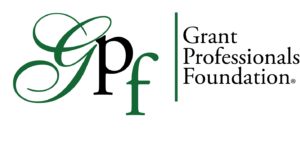Grant Professionals Foundation Scholarship
What can be said about the value of the Grants
Professional Association’s Annual Conference and the Grant Professional
Foundation’s Conference Scholarship to a grant professional?
More than can be surmised in fifteen hundred words.
However, defining the undefinable with efficiency and brevity is what we do
best as grants professionals! Right?!
I wish to first extend my immense gratitude to the Grants
Professional Foundation (GPF). This year, due to the impact of COVID 19, I would
have been financially unable to attend the GPA Conference. Thanks to the
generous opportunity provided by GPF, I was able to attend the full virtual conference.
This conference is an incredible and unmissable event for a grant professional.
The tremendous altruism of the grant community and GPF are well represented in
this scholarship program. Through these scholarships individual grant
professionals like myself, as well as organizations, can advance their
knowledge and skill set.
To the Grant Professionals Foundation and the Grant
Professionals Association, I extend my heartfelt and sincere thanks.
Why the GPA conference and this scholarship are so
important to the grant community at large is clear.
The Grants Professional Association’s (GPA) National Conference
is more than workshops and networking. It is a community. Gathered once a year
are the best and most knowledgeable professionals in the grant business. They
are also the most welcoming and supportive network of people you could hope to
join. I have never felt more at home then when I am at a GPA conference (well
except for when I am at Disneyland!)
GPA and its affiliated organizations, like GPF, advocate
for excellence. They promote ethical practices, support for their members, and
help the membership achieve individual success. GPA’s leadership leads by
example, upholding the values they espouse. I have interacted with Mike
Chamberlain, Kelli Romero, and Barb Boggs on many occasions. Each interaction
was professional, friendly, and clearly fueled by a desire to assist their
membership. I cannot say enough wonderful things about how immensely helpful
GPA staff are. Whether it is clarifying an ethical concern or just fielding
general questions about conference registration, the GPA staff are quick to
reply and thorough in their response.
As a grant professional at the start of my career, GPA is
the best investment I have made towards my future. In a field that requires
continued education, GPA provides me with the tools needed to take my grants
career in the direction that best suits me. It was through the conference that
I was introduced to the Grant Professionals Certification Institute (GPCI).
GPCI and the Grant Professional Certification (GPC) are an excellent way to
strengthen your knowledge and advance your career. Having an GPC is my next
goal as a grant pro. A GPC gives consultants, like me, a way to better showcase
our talents and promote ourselves to potential clients. Being afforded this
opportunity is truly an amazing thing. Often a grant professionals’ expertise
is not fully understood or appreciated. A GPA membership and a GPC give grant
professionals an extra layer of support and validation. This is vitally
important during those times when a client or organization needs additional
guidance or leadership. In those times a grant professional may not be fully
appreciated, or their input dismissed. The backing of GPA and a GPC can assist
with this, giving strength to the grant pro when they need it most.
Another wonderful aspect of the conference is the
networking opportunities. I have attended three GPA Conferences since joining
in 2018, two of them have been virtual. During my first conference I signed up
for the mentor program. My GPA mentor has been both friend and advisor in the
years since. Through my advisor I have met a network of amazing colleagues.
Each of whom has shared their time, experience, and expertise with warmth and
generosity. At this year’s conference I introduced myself in a lunch session
rather meekly, downplaying my role and skill set. My mentor and others in the
chat (one of whom was Johna Rogers the VP of GPA’s Board of Directors!) immediately
rallied to boost my confidence and help me realize the value of my work. As the
session went on, they did the same for others, supporting, and galvanizing each
individual with their encouragement. To see how quickly GPA’s membership and
leaders rallied to support their members was inspiring. In a year where it
seems impossible to stay positive, they were, and freely bestowed that
positivity on others! It was also amazing to see that this was possible through
a virtual format. That is how genuine each of these amazing individuals and
their sentiments were.
Even with the virtual nature of this year’s conference, I
was able to make real connections. In previous years there was only a small
representation of grant professionals from Northern Arizona, where I work. This
year, perhaps because of the virtual nature of the conference, there was a
large turnout of grant pros from my neck of the woods. A few were even from my
city! It was encouraging to see other professionals from my local area. So,
encouraging in fact that at the time of writing this essay a meeting is set to
discuss the potential of a Northern Arizona GPA Chapter!
The breakout and lunch sessions were also wonderful. In
breakout sessions, each conversation I had was meaningful. It was wonderful to
connect with so many other grant professionals. I gained a wealth of new
insight into grant work and my colleagues. It was wonderful to share this
experience with others in a way that felt natural and intuitive. The breakout
sessions were run so smoothly. They were a wonderful way to overcome the
limitations of social distancing and to achieve what is best about the conference,
building a grant professional family!
At every conference I have taken away lessons I have been
able to apply to my work. From federal grant compliance to improving your
writing, GPA’s presenters share their skills and advice with the intention to
make the grant world better. In my short time as a grant professional I have
come across my share of challenges. At each hurdle I have been able to call on
something I learned from my GPA Conference experience. The seminars I attended
were creative and insightful. Whether the topic was advancing my career or
addressing gaps in my skill set, each seminar provided me with something
beneficial. For example, Amanda Day’s presentation about Elizabeth Holmes was
particularly illuminating. It was an excellent case study in what not to do
while running a nonprofit. As someone who is still just starting out (or feels
like they are) it was a great introduction to some of the red flags a grants
consultant may encounter with potential clients.
This year’s conference left me feeling more confident in
my abilities. I felt the skills I already had were strengthened while I grew
and gained additional skills. The new skills I acquired this year are already
being put to good use with my current work as a subcontractor. When I began
working as a grant consultant, I had a very specialized niche, museums. While I
worked on a wide variety of grant types (federal, state, local, and foundation)
and a wide number of projects, I only truly wrote on one hyper-specific subject
matter. When I began to branch out and seek subcontracting opportunities and
new clients, I soon realized my specialization may have been limiting my
potential.
This conference I focused on attending seminars that
would broaden my skill set and help me become a more versatile writer and
consultant. This is also why I decided to take on subcontracting work, to
apprentice, if you will, under more experienced grant professionals.
While museums are still my foremost passion, it became
undeniably obvious that I needed to broaden my expertise to accommodate a
larger range of clients more effectively.
Grants and organizations like GPA have a far greater
impact that many understand. When a GPA member attends a conference, they take
their knowledge and skill back to their communities. This knowledge and these
skills are then employed by the grant professional for the good of their
community. My goal to broaden my knowledge base was also partially spurred by
this realization.
I have become aware that there is a lack of support for
schools, non-profits, and youth-based organizations where I live. In a city with
a high population of retirees, there are many who argue that organizations and
programs that do not directly benefit that population are not worth supporting.
Many organizations rely heavily on grants to survive. I hope that in the near
future what I have gained from GPA can be instituted in my community.
By supporting me with a GPF scholarship, GPA has not only
helped me, but helped my local community.
So, what is the value of the GPA National Conference? In
short, it is invaluable.
You cannot put a dollar amount on what can be gained from
the conference, or a GPA membership. What you take away from being a part of
this community is so individualized and long lasting that in the end you feel
you owe GPA!
More information about Conference Scholarships, including application dates and eligibility criteria, is available here.

